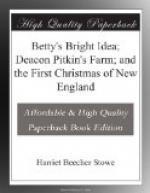“You ought to have seen how poor, how very poor they were. His wife is such a nice, quiet, hardworking woman, and has two such pretty children. I went to see them and carry them Christmas things yesterday, but it’s no good doing anything if John can’t get work. She told me how the poor fellow had been walking the streets in the cold, day after day, trying everywhere, and nobody would take him. It’s a dreadful time now for a man to be out of work, and it isn’t fair his poor wife and children should suffer. Do try him again, papa!”
“John always did better with the pineapples than anybody we have tried,” said Mrs. De Witt at this point. “He is the only one who really understands pineapples.”
At this moment the door opened, and there was a sound of chirping voices in the hall. “Please, Miss Florence,” said Betty, “the little folks says they wants to give you a Christmas.” She added in a whisper: “They thinks much of giving you something, poor little things—plaze take it of ’em.” And little Tottie at the word marched in and offered the young princess his dear, beautiful, beloved string of glass beads, and Elsie presented the cross of red berries—most dear to her heart and fair to her eyes. “We wanted to give you something” she said bashfully.
“Oh, you lovely dears!” cried Florence; “how sweet of you! I shall keep these beautiful glass beads always, and put the cross up over my dressing-table. I thank you ever so much!”
“Are those John’s children?” asked Mr. De Witt, winking a tear out of his eye—he was at bottom a soft-hearted old gentleman.
“Yes, papa,” said Florence, caressing Elsie’s curly hair,—“see how sweet they are!”
“Well—you may tell John I’ll try him again.” And so passed Florence’s Christmas, with a new, warm sense of joy in her heart, a feeling of something in the world to be done, worth doing.
“How much joy one can give with a little money!” she said to herself as she counted over what she had spent on her Christmas. Ah yes! and how true that “It is more blessed to give than to receive.” A shining, invisible hand was laid on her head in blessing as she lay down that night, and a sweet sense of a loving presence stole like music into her soul. Unknown to herself, she had that day taken the first step out of self-life into that life of love and care for others which brought the King of Glory down to share earth’s toils and sorrows. And that precious experience was Christ’s Christmas gift to her.
[Decoration]
DEACON PITKIN’S FARM.
[Illustration: The Pitkin Homestead. ]
CHAPTER I.
MISS DIANA.
Thanksgiving was impending in the village of Mapleton on the 20th of November, 1825.
The Governor’s proclamation had been duly and truly read from the pulpit the Sunday before, to the great consternation of Miss Briskett, the ambulatory dressmaker, who declared confidentially to Deacon Pitkin’s wife that “she didn’t see nothin’ how she was goin’ to get through things—and there was Saphiry’s gown, and Miss Deacon Trowbridge’s cloak, and Lizy Jane’s new merino, not a stroke done on’t. The Governor ought to be ashamed of himself for hurrying matters so.”




